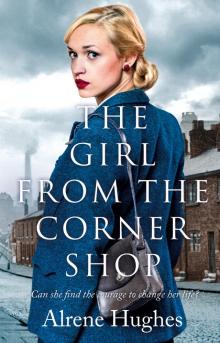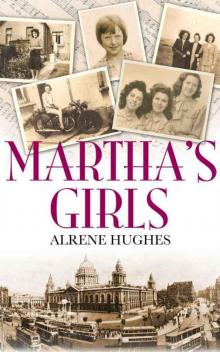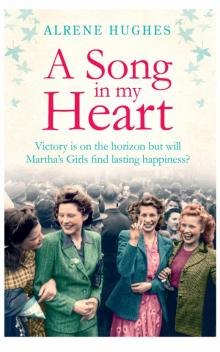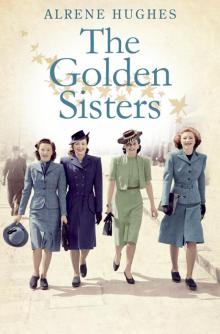- Home
- Alrene Hughes
Golden Sisters Page 3
Golden Sisters Read online
Page 3
Pat laughed. ‘A hatpin?’
‘Aye,’ Martha could see the humour of it. ‘Well it’s better than nothing and make sure you put plenty on you, it’ll be cold up there.’
Saturday morning dawned grey and wet and Peggy was soaked by the time she arrived at the music shop. She would be on her own all day because Goldstein and his niece Esther did not work on the Jewish Sabbath. Peggy hoped that, with a bit of luck, the weather might even keep the customers away, giving her the time to set her plan in motion.
She began with Irene’s list of songs. They had three of the records in stock, and sheet music for the others. By the time she’d played the records a few times she had the tunes in her head and sat at her favourite upright piano and picked out the melodies. She had been taught to read music by Martha, but preferred to play by ear – listening and playing over and over until she had it exactly right. The few customers who ventured into the shop were given brisk service and little in the way of pleasantries since Peggy’s head was filled with the songs and the harmonies needed for three voices.
Goldstein expected her to work through lunch, taking a short break only when there were no customers, but today at one o’clock she hung up the closed sign, pulled the blinds and locked the door behind her. The rain had stopped and a watery April sun peeped from behind the clouds as she walked up Donegall Place to Robinson and Cleaver’s department store. She went straight to the first floor and scanned the signs for the one that read ‘Ladies’ Cocktail Dresses’.
Style, she told herself, that’s what we need.
She went through the racks at speed, having in her mind something she’d seen in a Bette Davis film: slim shape, with a scooped, off-the-shoulder neckline. And there it was … the colour of kingfishers, it caught the light and shimmered first blue, then green. On a stage under spotlights the colour would dance. She headed for the fitting room, curtly dismissing the salesgirl’s offer of help.
The dress fitted her like a glove. She held her hair up and turned from side to side seeing herself utterly changed from every perspective. She stepped back from the mirror and moved to the rhythm of the song she’d had in her head all morning. Perfect. The price, of course, was ridiculous, two weeks’ wages for the dress and they needed three. No matter. Up Royal Avenue she marched and into the fabric shop to search through the dress patterns. The shape of this one, the neckline of that, and maybe some added darts at the waist. Yes, she could see it clearly. She bought the two Butterwick patterns and wandered around the shop looking at bolts of cloth. There was a display of shot silk draped over mannequins. A quick calculation told her the material for each dress would cost one weeks’ wage. All she had to do was find the money.
The doors of the Plaza Ballroom were chained up, but Peggy was undeterred. At the back of the building she found an open door and three men sitting on upturned beer crates playing cards.
‘Y’all right there, love?’ asked one of them, hat tipped back and a cigarette hanging from his mouth.
‘I’m looking for the owner.’
‘You wouldn’t catch the owner in this place,’ he laughed. ‘What is it ye want?’
‘I’ve come about a job.’
‘Have ye now?’ He stood up and flicked his cigarette out into the street and nodded towards a dark corridor for her to follow him. Peggy didn’t hesitate.
She’d been to the Plaza once before, to the Christmas Eve dance in 1939, and she remembered it as an elegant ballroom hung with garlands and huge paper bells, with a mirrored ball reflecting the spotlights that swept the room. She remembered, too, the romance of it, dancing all night with Harry Ferguson, the touch of his lips, the words he whispered. Now Harry was gone, away to England to join the army, leaving her and his debts behind. She pushed the image away.
The man led her to a double door and ushered her in. She could see immediately how run-down everything was: paint peeling from the ceiling; dirty, brocade-covered chairs; a stale smell in the air.
‘Somebody here wants a word with ye, Devlin.’
The man was behind the bar with his back to them, stacking bottles of lemonade on the shelves. ‘I’m busy,’ he shouted over his shoulder.
Peggy stepped forward. ‘I can see that,’ she said. ‘In fact, I’ve not got a lot of time myself so I’ll get straight to the point. I’m here to enquire whether you’re looking for new resident singers for the band.’
‘Nope.’
‘I think you’ll find that the act I’m speaking about – they’re called the Golden Sisters – could really add some style to the Plaza.’
He carried on stacking bottles. ‘Got all the style we need.’
‘They’ve all the latest songs from America in their repertoire.’
‘I’m not interested.’
‘Well you should be!’ Peggy raised her voice.
The man turned and stared at her. ‘What do you want?’
‘I told you. I want the Golden Sisters to be resident singers with the Plaza band. We’re very good. You should hire us.’
‘Listen, love, I don’t need any singers.’ He came out from behind the bar and walked slowly round Peggy, looking her up and down. ‘But I’m short of a cloakroom girl, since the last one took fright of the bombs and went back home over the border.’
‘Do I look like a cloakroom girl?’
‘Well you could if you tried.’
For a split second Peggy thought about storming out, but instead she asked, ‘Would you be needing a pianist at all?’
James Devlin shook his head in disbelief. ‘Are you always like this?’
‘Like what?’
‘Pushy, persistent.’
Peggy looked him in the eye. ‘If you never ask, you never get.’
‘You’ve certainly asked, but I’m telling you I don’t need singers or a pianist. I need a cloakroom girl for tonight. The pay’s five shillings and, if you’re a bit nicer to the customers than you’ve been to me, you might get a few tips as well.’
Peggy opened her mouth to argue, closed it again and thought about the five shillings. ‘What time do I start?’
‘Right, I think you’re all set,’ said John McCracken when Sheila arrived at the shop on Saturday morning. ‘I’ve brought a couple of sacks of potatoes round the front. It seems like that’s all some people are eating these days, so you should sell plenty. Now there are two boxes of Armagh apples fresh in, so try and sell as many of those as you can. I don’t mind if people buy them in ones or twos, as long as they go. The carrots are on their last legs, so drop the price after dinner. If anybody asks for tick refer them to Aggie. I don’t mind if they’re regular customers, but I’ll not give credit to people we don’t know.’
‘That’s grand, Uncle John. Are you going to be away all day?’
‘Lord only knows. The situation’s desperate and they’ve asked our group to work on the Unity Street ARP post. You know, the one that took a direct hit. Thirteen good men lost, some of them still unaccounted for. We’ll be shifting rubble ’til the light goes at least.’
‘But Aggie’ll be working with me, won’t she?’
‘She’ll do her best, but Aunt Hannah hasn’t been that good these last few days. Had us up all hours of the night, thinking it was morning and asking for her breakfast.’
‘Still a bit confused is she?’
‘A bit? Lord save us, some days she thinks I’m her father and other days she doesn’t know me at all and wants me out of her house. I tell you it’s the strangest illness I ever saw.’
‘Uncle John …’ something in Sheila’s tone made him stop stripping the wilted leaves from the cauliflowers. ‘Mammy’s been talking about sending me away to the country.’
‘What, evacuated?’
Sheila explained about Pat wanting to put her name on the ministry’s list. ‘I don’t want to live with strangers. Will you tell Mammy I’m needed in the shop?’ she pleaded. ‘I know she’ll listen to you.’
‘Now, now, young Sheila, your mammy will wa
nt to do the right thing. She’ll think long and hard before she makes a decision. Remember the scriptures: “Honour thy father and thy mother.” You know what that means?’
‘Aye, I’ve got to do what she tells me.’
‘Precisely. Those bombs the other night were the work of the devil …’ John shook his head to clear it of the sights he had seen. ‘God forbid, you’re caught up in anything like that.’ He arranged the cauliflowers in a pyramid, closed his penknife and almost smiled.
‘What is it, Uncle John?’
‘I’m minded of a time when I was close to your age, the summer of 1900. There was trouble on the streets for a while then and our mother sent us away to some cousins in Cavan. Ha! Thought we’d landed in the back of beyond. The girls cried themselves to sleep every night, wanting home.’ He paused a moment, remembering. Sheila waited. Eventually he blinked a few times and said quietly, ‘Happiest months of my life.’
He was suddenly animated. ‘Come with me!’ he shouted and Sheila followed him through the shop where Aggie was sweeping the floor.
‘Hello Sheila, how are you?’
‘No time for niceties, Aggie,’ shouted John over his shoulder, ‘we’re on a mission!’ Sheila followed him through the back kitchen …
‘Hello Father,’ shouted Aunt Hannah.
… out into the yard. ‘Wait here,’ said John, and he disappeared into the shed.
It sounded like he was wrestling in an ironmonger’s and after a few minutes the door opened and a large wicker basket appeared followed by a pair of handlebars.
‘What do you think?’ John sat astride the delivery bike, his ARP uniform covered in cobwebs.
‘I don’t understand, Uncle John.’
‘When I was sent to Cavan I learned to ride a bike and spent all summer riding the country lanes. It was such an adventure.’
Sheila walked round the bike. The tyres were flat, the saddle was mildewed, and the black paintwork was dusty – but she saw the possibilities.
At seven o’clock precisely Peggy walked into the entrance hall of the Plaza on Chichester Street, past the ticket booth and the cloakroom and straight into the ballroom. It was transformed from the shabby, draughty hall she’d seen a few hours earlier. Wall lights cast a soft golden glow and, from the ceiling, the mirrored ball reflected fragments of light that chased each other around the room. The stage was hung with red velvet curtains and the band was tuning up.
‘You’re here then, cloakroom girl.’
‘My name’s Peggy. I said I’d be here, didn’t I?’
James Devlin came out from behind the bar. ‘Glad to see you’ve reported for duty looking smart.’
Peggy’s eyes widened at the sight of him in a tuxedo with a white dress shirt and black bow tie. His hair was brushed back and gleaming. ‘I’d say the same about you, but you’re a bit over-dressed for a barman, aren’t you?’
He raised an eyebrow. ‘I could be the barman. In fact, as I’m the manager, I could do most of the jobs here.’ There was an edge to his voice.
‘Peggy gave him her brightest smile, ‘Would that include cloakroom girl, Devlin?’
‘Of course.’
‘What about pianist or resident singer?’ It was Peggy’s turn to raise an eyebrow.
He looked at his watch. ‘I think it’s time you started work,’ and he walked away calling over his shoulder, ‘and only my friends call me Devlin. You just call me Boss.’
One of the barmaids who had experience of the cloakroom showed Peggy how the ticket system worked. ‘You should be able to manage on your own. We haven’t had that many in since the bombing; people are afraid it’ll happen again, I suppose.’
For the next two hours, Peggy felt she was rushed off her feet. Goodness knows what it’s like when it’s busy, she thought. Then almost instantly there was no one wanting to check in a coat. On cue, the barmaid returned to relieve her. ‘Nothing much happens for the next hour until people start to leave, so you can have a bit of a break. Get yourself a drink at the bar.’ She nodded at the saucer on the cloakroom counter. ‘Take your tips. You’ve done quite well there.’
The band was playing a waltz in a lively enough style, but the drummer was a fraction off the beat. Peggy bought a lemonade and sat at the bar watching the dancers move round the floor. The singer was introduced; a thickset man in a dinner suit that had seen better days. The opening bars played and she instantly recognised ‘Let’s Put Out the Lights (and Go to Sleep)’. Might as well do, she thought, because there’s no life in his delivery – another two-a-penny crooner. The second song was a quick step, ‘I Get a Kick Out of You’, but his phrasing wasn’t quite right …
‘Excuse me, would you like to dance?’
He was a sailor, not that old, not that tall, but she took his hand. He was a passable dancer who concentrated on his steps, rather than his partner, but she didn’t mind. When the music ended, he thanked her and moved away. There was a tap on her shoulder and she turned, smiling, to face her next partner.
‘What do you think you’re doing?’ Devlin’s eyes were blazing. ‘I’m not paying you to pick up men!’
‘I’m not picking up men. I’m on my break.’
‘No, you’re on my time and the rule is no mixing with customers!’
‘You didn’t tell me that!’
‘I’d have thought it was obvious.’
Peggy could have raised her voice and made a scene, lost a job she didn’t really want, but she was so struck by the squareness of Devlin’s jaw and the cleft in his chin … He really had the most beautiful face …
‘I’m sorry, Boss. It won’t happen again.’
‘Aye well, it had better not.’
‘I’ll get back to work,’ she whispered.
Martha knew that she smelled of death even though she had ceased to be aware of it hours ago. All day she had met relatives, shown them decaying bodies, comforted them and cried with them until the light began to fade and they closed and locked the doors of St George’s Market. It had been the bleakest day of her life, but she was glad she’d volunteered, not least because she would be able to reassure Irene that Myrtle’s body had been claimed by her family. Before she left she agreed to return the following morning, the last day the unclaimed bodies would be on view. Don’t think about it until then, she told herself, and hoped that the walk up to McCracken’s shop on Manor Street would clear her mind and freshen her clothes.
Sheila was serving a customer when she arrived. ‘We’ll be closing in a minute, Mammy. Go through to the back, Aggie’s in there with Aunt Hannah.’
‘How is she today?’
‘Ach, she’s had us in stitches. Keeps calling me Martha, so she’ll be really confused when she sees you, but sure she’s happy enough.’
‘Well, that’s all that matters.’
‘Oh, and she’s going dancing later.’
‘Dancing?’
Sheila giggled. ‘You’ll see!’
Martha went through the chenille curtain into the cosy kitchen that also served as a living room. The McCrackens were her cousins on her mother’s side; the three siblings John, Aggie and Grace had never married, nor had their elderly Aunt Hannah. Aggie was at the sink, engulfed in steam, draining a pan. ‘You’re just in time for something to eat, Martha, if you’re partial to wilting cauliflower and plenty of it.’
From behind the door, hidden from view, Aunt Hannah shouted, ‘What’s that awful smell?’
‘Cauliflower!’ shouted Aggie.
‘I think it might be me,’ said Martha, peeking round the door. Then, catching sight of the old woman, her jaw dropped, ‘What on earth!’
Aggie, still clutching the huge steaming pan, started to laugh. Sheila came in, looked from her mother’s shocked face to Aunt Hannah’s, which was made up like a Hollywood starlet, and howled with laughter.
Martha had to smile. ‘What’s going on?’
Neither Aggie nor Sheila could compose themselves long enough to explain. Then Martha noticed the rows
of beads round Aunt Hannah’s neck, the jangling bangles on her wrists and the dandelion corsage on the shabby ballgown. By now Aunt Hannah was laughing too, looking from one face to the other. Martha resisted the urge to join in. ‘Is she …’
‘Yes, I’m going dancing,’ and the old lady smiled in delight showing her false teeth smeared with bright red lipstick.
‘Sheila, open the window, will you, and let that smell out while I get the tea on the table,’ said Aggie, ‘and, Martha, get the herrings out of the oven, they’ll take away the taste of the cauliflower.’
Around the table, Aggie explained Aunt Hannah’s appearance. ‘She thinks she’s eighteen again. Talked this morning about someone called George taking her to a dance and how she needed to get ready. Before I know it, she’s found that old dress in the bottom of the wardrobe and, would you believe it, a pair of gutties for her feet! I ask you, what can you do? When she appeared with the lipstick in her hand, Sheila put it on her and a wee bit on her cheeks. The oul dear’s had a great day. Mind you, we’d better get her shipshape before John gets home. You know what he’s like. He’ll be reading us the story of Jezebel and asking awkward questions about where she got the lipstick!’
They were doing the dishes when there was a knock on the shop door. ‘Away out, Sheila, and tell them we’re closed,’ said Aggie. ‘You can’t even get your tea in peace these days.’
Seconds later, the sound of Aunt Hannah’s delighted laugh and clapping broke the silence and Aggie and Martha turned from the sink to see Sheila had returned, followed by a portly young man with a florid face. ‘This is Reverend Taylor from St Mary’s up the road. He’s invited us to a prayer meeting tomorrow to raise our spirits.’
‘George!’ shrieked Aunt Hannah and with the support of her stick she was on her feet reaching for him. ‘I’m all ready to go.’
He took a step backwards. ‘But it’s not ’til tomorrow.’
But it was too late. Aunt Hannah began to sing ‘Come into the garden, Maud’ and stepped forward. One hand gripped his shoulder, the other took his hand and she waltzed him round the room.

 The Girl from the Corner Shop
The Girl from the Corner Shop Martha's Girls
Martha's Girls A Song in my Heart
A Song in my Heart Golden Sisters
Golden Sisters